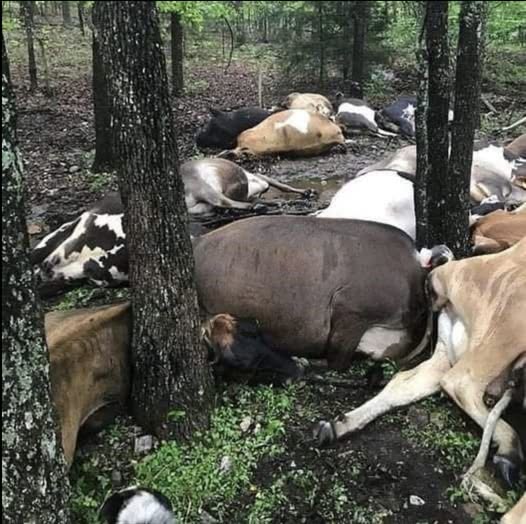Life has a way of reminding us just how fragile and unpredictable it truly is. One moment, everything feels stable—routine, even—and the next, the world around you can collapse in ways you never imagined. For Jared and Misty Blackwelder, a farming couple from Springfield, Missouri, that harsh reality arrived on what seemed like just another ordinary Saturday.
That morning, they went about their usual chores, feeding their dairy cows and surveying the land, reassured by the fact that the recent flooding had subsided. Though there were storm clouds gathering in the distance and the occasional rumble of thunder, there was no immediate sense of danger. Confident that their herd was safe, they allowed their 32 dairy cows to graze in the open pasture while they turned their attention to other tasks, completely unaware that disaster was silently approaching.
Hours later, Jared returned to check on the animals—only to stumble upon a sight that would haunt him forever. Every single cow, all 32 of them, lay lifeless in a heap. Lightning had struck the pasture, killing the entire herd in one devastating moment. The field that had once echoed with the soft movements and familiar sounds of his animals was now eerily silent.
The tragedy was so unusual that it captured the attention of local media and agricultural groups. Photos shared by the Wright County Missouri Farm Bureau showed the grim aftermath, urging people to offer their thoughts and prayers for the devastated family. According to Stan Cody, President of the Missouri Farm Bureau, lightning strikes are not uncommon in farming communities—but what made this event particularly shocking was the scale of the loss. In most cases, only a handful of animals are affected, but 32 at once was nearly unheard of.
A local veterinarian later confirmed that lightning was indeed the cause. While rare, the scenario made sense: the cows had likely huddled close together for shelter as the storm intensified, making them all vulnerable to a single, deadly bolt.
For Jared, the emotional toll was crushing. “It’s not like they’re pets,” he said, trying to hold back emotion. “But the ones I’m milking, I’ve raised every one of them. Dairy cattle are different—you’re with them twice a day, every day. It knocks you hard.”
Beyond the emotional impact, the financial loss was staggering. Each cow was worth between $2,000 and $2,500, bringing the total damage to over $60,000—money that represented not just income, but years of investment, care, and dedication.
This wasn’t just the loss of animals. It was the collapse of a livelihood, a daily rhythm, and a bond that most people outside of farming will never fully understand. The Blackwelders didn’t just lose their cows that day—they lost a part of themselves, and a future they had worked hard to build. The pain of that kind of tragedy doesn’t fade quickly, and the scars it leaves are not just on the land, but on the heart.
